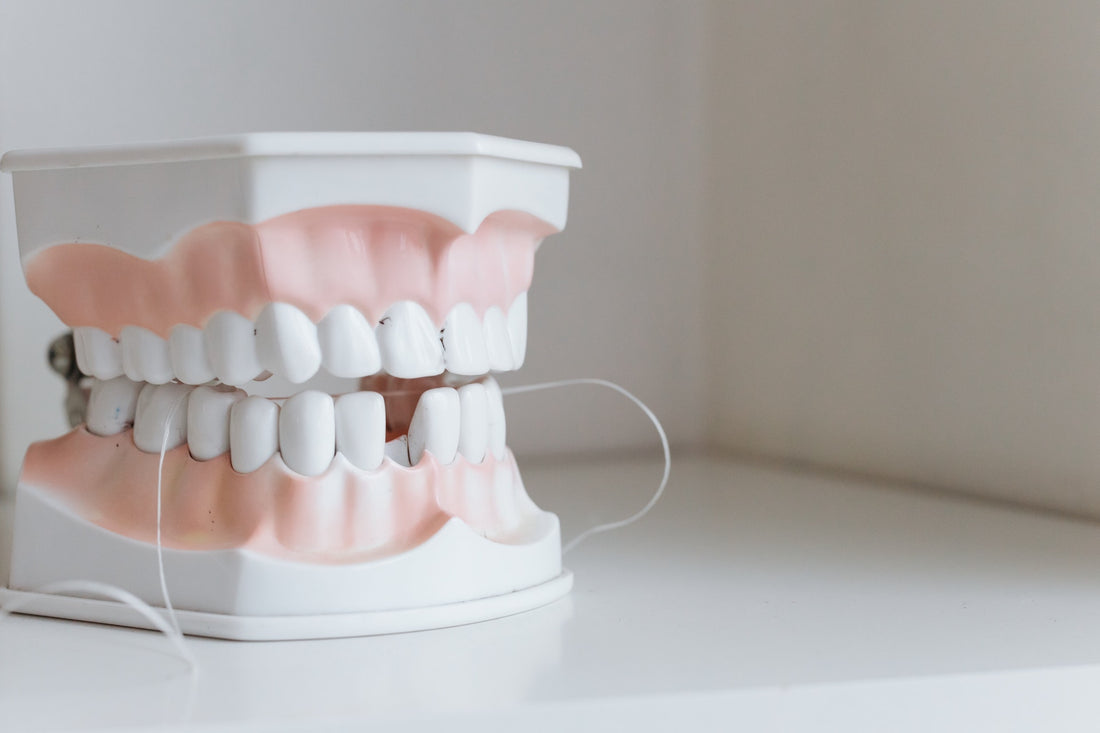
Why is it Important to Take Care of Your Gums?
Share
Forty-seven-percent of the US population over the age of 30 experience some version of gum disease. With such a significant prevalence, there is strong value in supporting February as “National Gum Disease Awareness Month”.

What is gum disease?
Teeth are surrounded by supporting structures. Gum disease occurs when there is an infection affecting these supporting tissues. As a result of gum disease, the gums initially become swollen, red, tender, and bleed easily. Without intervention, the infection worsens, and the bone that holds the teeth in place is likely to become affected. It is important to remember that our gums are the foundation of a healthy smile. If gum health becomes compromised, the teeth will not have the support necessary to hold up that foundation.
Gum disease, also known as periodontal disease, is based on a grading and staging classification system. Many factors are considered when determining its severity. The first form of gum disease is called gingivitis. Gingivitis is inflammation of the gums. Gingivitis can be reversed with proper oral hygiene and routine dental care.
Common signs of gingivitis include:
- Red, swollen, puffy gums
- Sensitive or tender gums
- Bleeding gums during brushing and flossing
- Poor taste in the mouth
- Bad breath
Fortunately, the inflammation of gums from gingivitis can be reversed with meticulous oral hygiene that includes the daily removal of plaque through gumline brushing, flossing, use of an antimicrobial oral rinse, and routine dental cleanings.
If gingivitis is not reversed, the effects of gum disease progress into periodontal disease. Periodontal disease damages the structures surrounding the teeth that help hold them in place.
Common effects related to periodontal disease include:
- Loss of connective tissue around teeth
- Loss of bone that hold teeth in place
- Plaque and calcified plaque below the gums
- Loose teeth
- Gum loss
- Displacement of teeth or a change in their position

Particular risk factors have been associated with an increased chance for developing gum disease.
Common risk factors associated with periodontal disease include:
- Age (70% of adults 65 + have some form of gum disease)
- Genetics
- Medications (specifically certain heart medications, oral-contraceptives, and antidepressants)
- Particular systemic diseases: diabetes (especially if not well-controlled), cardiovascular diseases, and rheumatoid arthritis
- Diet/obesity
- Stress
- Tobacco use
Gum disease presents as a spectrum, and as its severity increases, the chances for good overall systemic health become a factor. It is essential to recognize when the disease is considered reversible and when it is not with this spectrum. Once the bone surrounding the tooth becomes affected, meaning either there is a change in the amount of bone present on an x-ray, teeth become mobile, or there is a new displacement of teeth, the disease process cannot be reversed. Once gingivitis has progressed into periodontal disease, its management becomes critical to slow down the disease process. The risk factors mentioned above play a factor in the progression and oral hygiene practices.
If periodontal disease is not well-controlled, the body is at risk for developing systemic diseases.
The systemic diseases that have shown an association with periodontal disease include:
- Diabetes (increased risk for dental infections such as gum disease)
- Cardiovascular (heart) diseases
- Respiratory diseases such as pneumonia
- Cancer (specifically lung and colorectal)
- Alzheimer's disease
A woman's hormonal changes may also factor into gum health. When hormone levels of estrogen and progesterone fluctuate, like during pregnancy, puberty, menstruation, or menopause, gums may become swollen and sensitive, bleed more easily, and potentially cause a change in taste.
Fortunately, aside from the genetic factor, gum disease can be prevented. While genetics may predispose you to gum health challenges, you are helping to combat those harmful bacteria associated with gum disease by implementing good oral hygiene practices into your daily routine.

Healthy oral hygiene practices include:
- Twice daily (gentle) gumline brushing with a soft bristled toothbrush
- Daily flossing to remove the plaque that attaches between the teeth
- Gentle and neutrally balanced toothpastes that include Manuka Oil
- Routine dental care every 3-6 months
- A diet rich in vitamin C
- A diet with reduced sugar and starchy carbohydrates
- A tobacco free lifestyle
- Drink lots of water
Gum disease can affect anyone. However, by implementing these practices into your daily routine and recognizing all of the ways you can prevent gum disease, you are setting yourself up for not only a healthy mouth but a healthy overall body.
About the author: Kristen Cockrell, MS, RDH
Kristen Cockrell is a mother to two boys and a Registered Dental Hygienist with a passion for preventive pediatric dentistry and oral health education. Kristen recently completed a master’s degree in dental hygiene education at the University of North Carolina at Chapel Hill.
Creative credit to the lovely @sll.stories
Photo credits to our beautiful Grin mama @bec.campbell___
